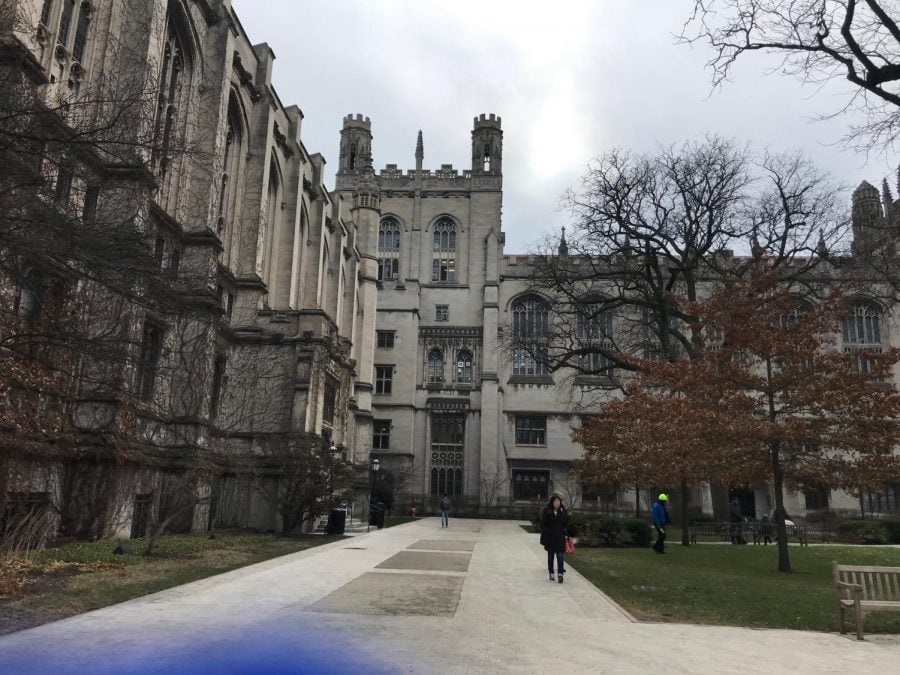Back in the classroom — or not: Breaking down Chicago universities’ approaches for the fall
Haley Fuller/Daily Senior Staffer
The University of Chicago’s campus.
September 9, 2020
Nine days before students were scheduled to move into dorms, Northwestern announced it would require all freshmen and sophomores to go completely virtual in the fall — a short-notice change from the previous plan to bring all students back to campus.
Upperclassmen will be allowed to return to campus, while students who planned to live in Greek housing and underclassmen with on-campus housing exemptions have the option of living in dorms. Students living on campus will be tested weekly, and upperclassmen living off campus will receive surveillance testing throughout the quarter.
As universities across the country grapple with the implications of allowing students back on campus, many have changed their plans for the fall. Some schools will allow students to return to campus, some will leave campus facilities open and others have turned to entirely virtual instruction.
Loyola University Chicago
Loyola announced it would close campus housing to students on Aug. 6, 18 days before classes began on Aug. 24. The university will still allow students living nearby to access campus facilities, including dining halls with restrictions and social distancing.
Loyola did not announce any tuition changes for the fall semester and will not host students experiencing extenuating circumstances in their residence halls. The university said it has assisted students with housing insecurity in the process of finding alternative housing.
“We share the deep disappointment inherent in this decision, even though it is the right decision,” Loyola President Jo Ann Rooney said in an email to students and families. “Faculty and staff worked tirelessly this summer to prepare our campuses for the fall semester, and I am deeply grateful for the way our community has come together as people for others to begin a new academic year in a safe and healthy way.”
University of Chicago
UChicago is proceeding as scheduled with its plans to move students into campus housing at limited density, with all first-years living in dorms and priority given to second-years for remaining spaces.
The university will stagger move-in over the course of five days, from Sept. 20 to 25. For students coming from one of over 20 states designated as high-risk in the Chicago Department of Public Health Emergency Travel Order, move-in times will be during one of the first two days of the move-in process. To facilitate a faster move-in process, UChicago is also allowing students to ship belongings to the university ahead of their arrival, beginning on Sept. 8.
Students will be required to follow either a university-mandated 10-day stay at home directive or a 14-day city-mandated quarantine based on the risk level of the state or country they are arriving from. The only difference between the two is the duration of the quarantine.
Students living on campus will also be tested for COVID-19 after their arrival, and will continue to be tested once a week. If they test positive, they will have to quarantine until at least 10 days after symptoms appear and 24 hours after a fever is resolved without medication.
University of Illinois at Chicago
UIC brought students back to campus in August in time for the start of classes on Aug. 24. Students returned to residence halls, with two additional buildings previously closed for renovation being reopened to de-densify student housing.
The school is following a hybrid model, with most classes online but some requiring an in-person component. Dining halls, recreation centers and student centers are all open with modified hours and safety precautions.
All students were tested upon arrival to the university, and testing has continued in the following weeks. According to its coronavirus dashboard, UIC has had 36 cases of COVID-19 and over 7,000 negative tests, for an average positivity rate of 0.45 percent. The university is currently at just under 56 percent occupancy.
DePaul University
After a decision last spring to rescind a planned tuition increase in light of COVID-19, DePaul announced on Aug. 12 that it would hold all fall courses online. Courses begin on Sept. 9, with limited occupancy in residence halls — students could apply for housing based on extenuating circumstances.
Though many campus resources are limited, the university will allow for more access to spaces such as computer labs and libraries than in the spring.
Additionally, DePaul is implementing a Pass/D/Fail scale for Fall Quarter. Students passing classes with a C- or higher will receive a “Pass” on their transcript, students with a D+ or D will have the corresponding grade on their record and those who don’t reach that grade will fail the course.
Columbia College Chicago
Like DePaul, Columbia College rescinded a scheduled tuition increase for the fall. The university plans to bring students back to campus, with a mandatory two-week quarantine period at the start of the semester. As a result, the first two weeks of classes are entirely virtual. After the quarantine, on Sept. 21 in-person and hybrid classes can begin face-to-face instruction.
Columbia College started courses on Sept. 8 after opening residence halls on Aug. 24. Additionally, the school restricted the kinds of acceptable face coverings for students — gaiters, bandanas, masks with vents and knitted masks were all deemed unacceptable because multiple scientific studies found they were inadequate in reducing the spread of the virus.
The university also mandated testing upon arrival and currently has one active case on campus.
Email: [email protected]
Twitter: @jacobnfulton
Related stories:
— Northwestern goes remote for first- and second-year students, reduces Fall Quarter undergraduate tuition by 10 percent
— Northwestern to allow incoming students year-long deferrals, on-campus housing contract cancellations












